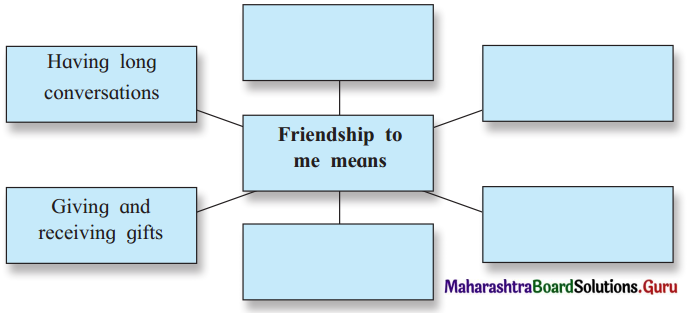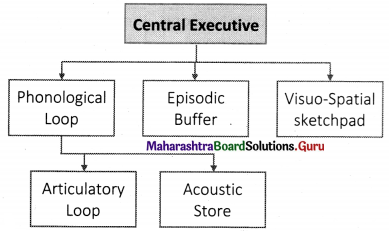Balbharti Yuvakbharati English 11th Digest Chapter 1.6 Tiger Hills Notes, Textbook Exercise Important Questions and Answers.
Maharashtra State Board Class 11 English Yuvakbharati Solutions Chapter 1.6 Tiger Hills
11th English Digest Chapter 1.6 Tiger Hills Textbook Questions and Answers
1. Ajoy and Sujoy went to watch a cricket match. They enjoyed it very much, but they missed their friends Vinay and Sunay. Next day, when the four friends met, Ajoy reported how the game was played, how the players performed and how the game ended. Sujoy told them that they missed Vinay and Sunay very much and they were eager to tell them about the enjoyments.
Question (i)
Complete the following sentences:
Answer:
(a) Ajay reported about the strategy of the game, the performance of the players and the way the game had ended.
(b) Sujoy reported about their feeling of missing their other two friends Vinay and Sunay and also about their eagerness to tell them how much they had enjoyed watching the cricket match.
![]()
Question (ii)
The word ‘report’ means –
(a) Give a spoken or written account of something.
(b) Cover an event or subject as a journalist or reporter.
Answer:
(a) Give a spoken or written account of something.
2.
Question (i)
Find out the meaning of the following words:
Answer:
(a) Reportage: The reporting of news by the press and the broadcasting media.
(b) Reporter: A person employed to find out informations about the news events and describe them for a newspaper, magazine, radio or television.
(c) Reported Speech: When a speaker’s words are reported in subordinate clauses governed by a reporting verb and the necessary changes of person and tense.
(d) Reportorial: A writer, investigator or presenter of news stories.
Question (ii)
Make a list of the factors which make war stories or war-movies interesting.
Answer:
(a) They are usually based on historical facts.
(b) They need to have a gripping story line.
(c) They help us to understand the risks and sacrifices of the soilders.
(d) They make us realize the importance of peaceful co-existence and the futility of war.
![]()
(A1)
Question (i)
Imagine that you are about to interview the writer. Write 10 to 15 questions regarding the operation.
Answer:
On the 20th Anniversary of Kargil war, we remember an armed conflict between India and Pakistan in the Kargil District of Kashmir and elsewhere along the Line of Control. We are fortunate to have in our studio General Ved Prakash Malik, who was the Chief of the Army Staff of India at that time.
Excerpts from the Interview :
- Good Morning, General Malik ! We are fortunate to have you in our studio on a day which is considered a zed-letter day in Indian history. What is the first word that comes to your mind when Kargil war is mentioned?
- How confident were you about Indian Victory?
- Was our Army prepared for such a difficult operation? Please give one or two examples.
- Your book on ‘Kargil’ says it all. How did you feel while narrating or rather reporting the events of those days?
- Kargil was the first war in Indian military history when media covered the entire battle live. How did you feel when you watched the coverage?
- What was your first reaction when this proposal came from media?
- You must have spent many sleepless nights when your boys were fighting a tough battle in Kargil. Share with us some of your experiences of those days.
- We have heard many stories of Kargil war like Vikram Batra, ‘Yeh Dil Mange More’. Tell us one or two of your unforgettable memories associated with ‘Operation Vijay’.
- There must be some memories of disappointments also. How did you handle them?
- What is your comment on the humanitarian norms maintained even at a time of emergency?
- How are the families of the Armymen involved when a war like this goes on?
- What was your first reaction when you heard about the moment of victory?
- What were your key words to your boys when you talked to them after they successfully accomplished the tough job?
- My last question to you is what do you want to say to the civilians about their behaviour during a war or a war-like situation?
Thank You very much General Malik for giving your valuable time to our viewers and all of us to make us know so many facts about the Kargil war.
(A2)
Question (i)
Enlist any four facts which made the capturing of Tiger Hill a national challenge.
Answer:
- The top of the Tiger Hill appeared almost impossible to capture since the enemy position on this mountaintop dominated parts of Srinagar-Kargil-Leh highway.
- Bad weather and a poor visibility due to darkness were two major hindrances for the Indian Army.
- Accurate firing by the well-trained enemy soldiers from the southernmost high ground was stalling the Indian Army for some time.
- Prevention of enemy reinforcements was an urgent necessity to evict the enemy from the Tiger Hill.
![]()
Question (ii)
Different arms and ammunitions are mentioned in the excerpt. Find their names.
Answer:
Some of the arms and ammunitions used in the operation Tiger Hill are :
- Bofors Guns
- Individual Guns
- Multi barrelled Grad rocket launchers
- Mortars
- Artillery
- Grenades
- Field and medium guns
Question (iii)
“Wars are not fought only on the battlefield’. Comment.
Answer:
This statement is true. Since in every walk of life, people have to fight to get their demands fulfilled and justice to prevail. The military war is, of course, fought in the battlefield but the family of the soldiers and the civilians also get involved since the country goes through a difficult phase.
In our day to day life also, we have to fight a number of battles. War against corruption, diseases, price-rise, natural disasters causing immense suffering and the fight one has to do to combat that, are all the wars that are not fought in the actual battlefield. They also have to be fought on the battlefield of life and they are the struggles for survival.
Question (iv)
Make a list of the preparations made for an assault on Tiger Hill.
Answer:
(a) Throughout the last week of June 1999, 18 Grenadiers probed to establish the extent of the enemy’s defences.
(b) They also explored to find out suitable routes for the assault.
(c) After confirming the multidirectional assault as the best strategy, the commanding officer drew up an elaborate artillery fire plan.
(d) Individual guns were ranged so as to cover each objective.
(e) Bofors guns were used in a direct firing role.
![]()
Question (v)
Complete the flow chart showing the events on the day of the assault.
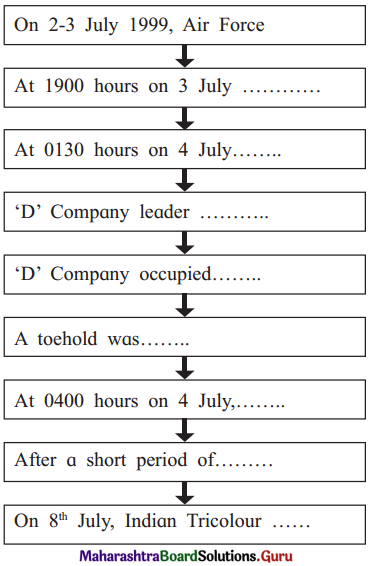
Answer:
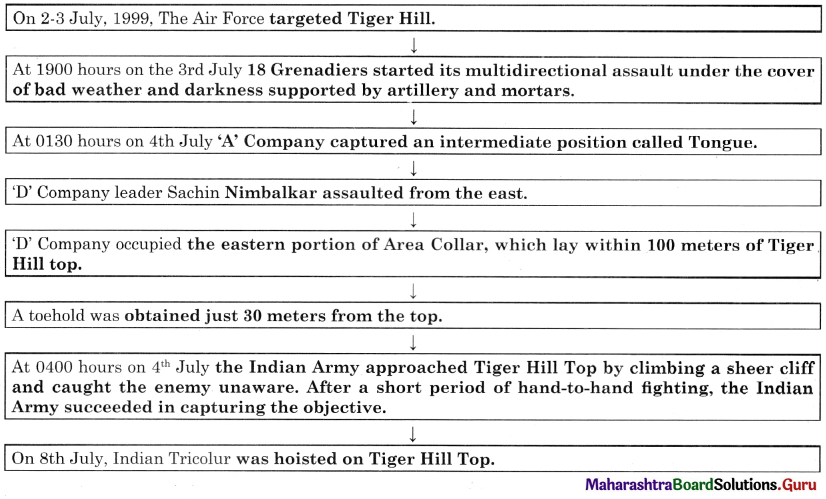 Question (vi)
Question (vi)
Rewrite the given statements in their order of occurrence.
The most difficult task of maintaining the hold on Tiger Hill was achieved in this way :
(a) 8 Sikh was ordered to attack and capture Helmet and India Gate.
(b) Bodies of the Pakistani soldiers were collected and buried appropriately.
(c)During the ferocious artillery duels the Grenadiers hung on their precarious perch with grit and determination.
(d) 8 Sikh fought back successfully two counterattacks with forty to fifty personnel.
(e) An adhoc column of 8 Sikh climbed the steep rock and captured India Gate.
(f) In spite of heavy casualties, 8 Sikh captured Helmet on 5 July.
Answer:
(a) During the ferocious artillery duels the Grenadiers hung on their precarious perch with grit and determination.
(b) 8 Sikh was ordered to attack and capture Helmet and India Gate.
(c) An adhoc column of 8 Sikh climbed the steep rock and captured India Gate.
(d) In spite of heavy casualties, 8 Sikh captured Helmet on 5th July.
(e) 8 Sikh fought back successfully two counterattacks with forty to fifty personnel.
(f) Bodies of Pakistani soldiers were collected and buried appropriately.
![]()
(A3)
Question (i)
Find out the meanings of the following idioms / phrases and use them in your own sentences.
Answer:
- To hit the bull’s eye – get something exactly right.
The reporter’s comments on the negligence of the authority hit the bull’s eve. - To be taken by surprise – to shock someone by one’s sudden appearance on action.
The enemy soldiers were taken by surprise when our soldiers attacked them suddenly. - To get a toehold – to get an initial, stable position to proceed further.
My friend is trying to get a toehold in the entertainment industry by doing modelling. - Under the cover of – hidden or protected by
The freedom fighters carried on many of their attacks under the cover of darkness.
Question (ii)
Find words from the text related to the war affairs.
Answer:
Brigadier, commander, capture, evicting, enemy, defense, mission, Mountain Brigade, artillery, combat, Grenadiers, strategy, assault, field, regiment, guns, The Air Force, military, target, company, infantry, captain, firefighting, duels, commando, hand-to-hand fight, bombardment, counterattack, battle, courage, reinforcements, Major, Lieutenant, soldiers, Subedar, casualties, Naib, Subedar, recapture, outcome, valour, victory.
(A4)
Question (i)
Find out the sentence with ‘Though, Although, Even though or But’ from the text and say its purpose.
Answer:
Although 18 Grenadiers held the top now, linking up with them was not so easy. Though/Although are subordinating conjunction which is used to introduce a subordinate clause and it needs a main clause to make it complete.
Question (ii)
Put ‘a/an’ or ‘the’ at proper places. Put a cross (x) where no article is applicable.
Answer:
- Ravi walked up to the principal’s cabin.
- Ahmed lives in a small town.
- Can I use × Cell Phone?
- Who’s the woman in your office?
- I need an English-Marathi dictionary.
![]()
(A5)
Question (i)
Imagine you are one of the soldiers from 18 Grenadiers on the mission Tiger Hill. Narrate your experience of the war to your friend.
Answer:
Today I get goosebumps when I narrate to you about our mission Tiger Hill. Thankfully, at that time we were mentally alert and were prepared to combat our enemy. Now, I can refer to the incident as a ‘story’ but it is a reality to fight for the honour of our Motherland. I was one of the members or I should say soldiers of 18 Grenadiers who were assigned the mission of capturing the Tiger Hill with 8 Sikh, which was already posted at the base.
Moreover, a crack-team, that is, a highly specialized team of soldiers who could respond quickly and smartly, were with us to assist. We found out the extent of our enemy’s strength and searched for the suitable routes to attack. I still remember, on 3rd July, 1999, at 7pm, we started our multidirectional attack with the support of our fire power of artillery and mortars. You can’t imagine how bad the weather was.
There was darkness all around and it was extremely cold. In spite of all adversities, we were successful in holding the top of the Tiger Hill, but connecting with other companies was very difficult. The enemy camp also came out of their initial surprise and fierce counterattacks started immediately. Casualties were many and the numbers were increasing, but by God’s grace we could hold on the top, facing all dangers.
I must say here that my colleague Grenadier Yogender Singh Yadav and his team showed exceptional courage. 8 Sikh team decided another strategy of stopping the supply route to our enemy and that worked wonders.
To cut a long story short, finally the entire mission was accomplished on 3rd July, 1999 at night. We captured the Tiger Hill Top, though heavy fighting was still going on. But the enemy was unable to dislodge us and we won this fierce battle, thank God !
Today, as I narrated the happenings of those days, my eyes were filled with tears. We have won the Kargil war, our operation Vijay, but I have lost many of my friends. I salute those martyrs. They are the bravehears who sacrificed their lives to safeguard the prestige of our dear Motherland, India.
Question (ii)
Would you like to join Indian Army/Navy/ Air force? If not, suggest other ways in which you could serve your nation.
Answer:
I may not join Indian Army / Navy / Air Force but I want to be a teacher and facilitate all round development , of my students. I believe ‘Examples are better than precept’ .
So, I shall never try to preach, but follow certain principles in my own life to motivate the students to become not only sincere in studies but be good human beings to be assets to the nation. The bravehearts who captured the Tiger Hill Top by sheer grit and determination have taught me the lesson of hard work, perseverance and devotion. I shall try to inspire my students to achieve these qualities to be pillars which will hold the nation strongly.
![]()
Question (iii)
Report Writing:
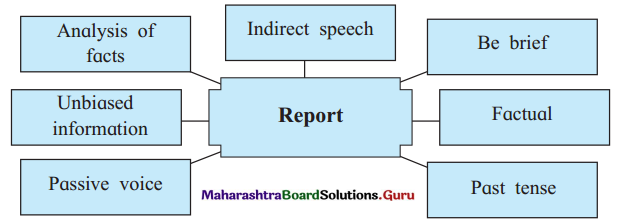
Question (i)
Study the web diagram and write the characteristics of report writing.
Answer:
A report should present factual and unbiased informations in brief and then analyze the facts. The reporter need to convert the comments of a person in indirect speech. He/she should always write a report in past tense and use passive voice.
Question (a)
You are Sharad Mathur, the General Secretary of the Sports Club of your college. Write a brief report of the Annual Sports activities for the college magazine.
Answer:
Annual Sports Activities 2019-20
Sharad Mathur.
(General Secretary, Sports Club)
27 December 2019
The sports club of xyz college, Ghatkopar had planned Annual Sports Activities for the academic session 2019-2020.
A variety of indoor and outdoor games were listed and our principals Dr. Atul Shanbag had approved the entire list. The professor-in-charge for sports, Shri Pankj Malhotra and his team of students had arranged for Inter-Collegiate Sports meet also where many colleges from Mumbai and its suburbs were invited to participate. The response was overwhelming. But, -before that, many intra college competitions were organized for our students to get enough practice.
Sports events were planned for the teachers also where teachers from other colleges in our college campus participated. These activities were interesting and the students enjoyed a lot.
As General Secretary of the Sports Club, I thank our principal, sports teacher and all the teachers of our college as well as teachers of our college campus and my dear fellow students for making the sports activities of their academic year, a grand success.
![]()
Question (b)
Your school organised ‘Van Mahotsav Day’ recently. Write in about 100 to 150 words a report to be published in the school magazine.
Answer:
Van Mahotsav Celebration
XYZ
Secretary, Green Earth
6 June 2019
Van Mahotsav was celebrated by Green Earth, the environment club of our college with a lot of interest from the students on 5th June, the World Environment Day. The Mayor of Mumbai, was the Chief Guest and she planted a sapling on the college compound. The principal Ms. Shobha Patil urged the students and the teachers to plant more trees and to launch a campaign to save the environment.
Speaking on the occasion, Mayor Ms. Chande told that God had created environment and human beings to stay in harmony with each other. But unfortunately the imbalance between the two was disturbing. We should join hands to remove this imbalance.
Students of XIth standard presented a street play on saving the environment. A Cultural Programme concentrating on environment-friendly topics, was presented by the students. The programme ended with the vote of thanks offered by the secretary of the Environment Club of the college, who expressed his gratitude to everybody present there for encouraging such awareness drive.
Question (c)
You are the secretary of the NSS unit of your college. Write a brief report of the Blood Donation Camp arranged by your unit.
Answer:
Blood Donation Camp, 2019
Sushant Mehta
Secretary, NSS Unit
27 June 2019
The NSS unit of our college organized a blood donation camp on 24th June,2019 at 9am in the college premises. Dr. Ashok Patel, the eminent surgeon of KEM Hospital. Was the chief guest.
The programme started with the college prayer. NSS Convenor, Shri Ashish Chopra Sir, welcomed the chief guest and introduced him. Our principal, in her speech, thanked the respected chief guest, for sparing his valuable time to motivate the donors, for the noble cause.
Dr. Patel, in his simple but motivating words made the donors aware that blood donation was safe for healthy adult and there was no risk for contracting diseases as new sterile equipments are used for each donor. He also informed that the donor’s body usually replaced the liquid part of blood within 72 hours after giving blood. He advised the donors to take healthy meal, plenty of water and to have a good night’s sleep. One of the members of the NSS Unit offered Vote of thanks. The Blood Donation Camp was grand success because of the overwhelming response from the student donors and some of our teachers.
Yuvakbharati English 11th Digest Chapter 1.6 Tiger Hills Additional Important Questions and Answers
Question 1.
During the war the soldiers need to plan strategies.
1. Find the strategies planned.
2. Find some words related with such strategies.
Answer:
1. The strategies planned were:
(a) A thorough investigation to find out the extent of the enemy’s defenses
(b) To look out for the probable routes of the attac k
(e) Drawing of a detailed fire plan of the heavy weapons by the commanding officers
(d) Individual guns were ranged to cover each target
(e) Bofors guns were used in a direct firing with accuracy
2. Words related with such strategies are: scout, probe, enemy’s defences, suitable route, strategy, fire plan, direct firing, assault, targeted, accuracy.
![]()
Question 2.
The enemy was taken aback due to the steps taken by the Indian Army. With the help of the text find out strategies of the Indian Army for such a situation.
Answer:
Captain Sachin Nimbalkar who was leading ‘D’ company, moved ahead with his company in a steep slope at the edge of the plateau ignoring darkness and bad weather. The enemy could never imagine that this could be made possible by the Indian soldiers and naturally they were surprised. There was another surprise waiting for the enemy when Lieutenant Balwan Singh along with ‘C’ Company and Ghatak (Commando) platoon could reach through one of the most difficult north eastern extension of the mountain, just thirty meters away from the top.
Both these approaches caught the enemy unaware and the Indian Army achieved their objective. Media supported and assisted the battle live. Guess the risks of the media people as well as of the army. The live coverage of media has its pros and cons. It is indeed a sign of progress and helps the army to access their strategies at the break of the war or after the war.
But too much of transparency can create confusion and invite criticism from the world around. Of course, there are always the risks of loss of lives as well as severe injuries of the civilian media people who might not have proper military training.
A great humanitarian norm is maintained during the battle. Find out and comment on it. At the time of war, it is important to remember basic humanitarian principles of life and the Indian Army has done exactly that while handling the casualties in the battle of Kargil.
Pakistani Captain Karnal Sher Khan lost his life in the counterattack from Indian Army. His body was handed over to Pakistani authorities with due respect. Other bodies of the deceased Pakistani soldiers, which were lying all over the battleground, were collected and cremated appropriately with the proper honour, a martyr deserved. The narrator uses selective words to express the Victory. They are:
- Jubilation
- Relief
- Replaced gloomy mood of the people
- Stabilized Situation.
Comprehension
Read the extract and complete the activities given below.
Global Understanding:
Question 1.
Rewrite the given statements in their order of occurance:
(i) 18 Grenadiers probed to scout for suitable routes for the assault.
(ii) A crack team assisted both 18 Grenadiers and 8 Sikh.
(iii) Air Force joined Tiger Hill Mission on 2-3 July.
(iv) Media Projected Mission Tiger Hill as a national challenge.
Answer:
(iv) Media Projected Mission Tiger Hill as a national challenge.
(ii) A crack team assisted both 18 Grenadiers and 8 Sikh.
(i) 18 Grenadiers probed to scout for suitable routes for the assault.
(iii) Air Force joined Tiger Hill Mission on 2-3 July.
![]()
Say whether the following statements are true or false and correct the false statements.
Question (i)
The bodies of the Pakistani Soldiers were handed over to the Pakistani authorities.
Answer:
False. The bodies of the Pakistani soldiers were collected and buried appropriately.
Question (ii)
The writer got the news of the captured hill in the early morning.
Answer:
True
Question (iii)
When the Defence Minister landed at the New Delhi airport, the writer gave him the exciting news.
Answer:
False. The Defense Minister landed at the Amritsar airport
Question (iv)
The Indians were in a gloomy mood when the war was going on.
Answer:
True
![]()
Complex Factual
Question 1.
Why did the media project Tiger Hill Mission as a national heritage?
Answer:
The clear visibility of the top of the Tiger Hill from the highway posed a big challenge for the Army. Not only was it exposed to everybody but the level of difficulty could also be felt before the beginning of the mission. That made the media come to the conclusion of referring Tiger Hill Mission, a challenge for the nation since all the activities of the soldiers could be seen.
Question 2.
Why was the writer keen to make the announcement on 4th July.
Answer:
The writer was keen to make the announcement of the recapture of the Tiger Hill to the world as a meeting was scheduled on the same day between the Prime Minister of Pakistan and the President of the USA. As Pakistan always denied the existence of such a mountain feature labelling it as a figment of Indian imagination, it was important for the world to know the reality, making Pakistani denial impossible.
Inference / Interpretation / Analysis
Question 1.
Make a list of four strategies that were planned for Mission Tiger Hill.
Answer:
The strategies planned were:
- A thorough investigation to find out the extent of the enemy’s defenses
- To look out for the probable routes of the attack
- Drawing of a detailed fire plan of the heavy weapons by the commanding officers
- Individual guns were ranged to cover each target
Question 2.
Why did the writer decide to wait for the announcement of the capture of the Tiger Hill? Explain. Answer:
The writer, after consulting to GOC 15 Corps and Nirmal Chander Vij decided to wait for officer’s announcement of the victory since heavy fighting was going on. There was still no confirmation from GOC 8 Mountain Division who was at the forefront. So, the writer decided for the authentic news to come to him from somebody who was at the war front.
![]()
Personal Response:
Question 1.
Explain whether you support live media coverage of the war.
Answer:
Yes, I agree with General Malik when he talks about transparency through the live media coverage. It is definitely a sign of progress and must be helpful for the Army for the assessment of their strategies. But, at the same time, live media coverage can create confusion which the reporters need to be careful about.
Question 2.
Express your feeling after reading the passage.
Answer:
I feel proud about Indian soldiers who took risks to save the pride of our Motherland. I am also extremely impressed by the respect showed to the enemy soldiers who also laid their lives for their country. I respect the way the writer has shown his responsibility to make an official announcement.
Language Study:
Question (i)
A simultaneous multidirectional assault emerged as the best strategy.
(Use the word ‘Good’and rewrite)
Answer:
No other strategy emerged as good as a simultaneous multidirectional assault.
![]()
Question (ii)
The Air Force targeted Tiger Hill on 2-3 July and hit the bull’s eye several times. (Use ‘Not only But also’and rewrite)
Answer:
Not only did the Air Force target Tiger Hill on 2-3 July but also hit the bull’s eyes several times.
Question (iii)
In India, wave of jubilation and relief replaced the gloomy mood of the people.
(Use ‘not only but also’)
Answer:
In India, not only a wave of jubilation but also relief replaced the gloomy mood of the people.
Question (iv)
The enemy would not be able to dislodge 18 Grenadiers. (Remove Negative)
Answer:
The enemy would be unable to dislodge 18 Grenadiers.
Vocabulary:
Question 1.
Pick up some names of the artillery used for Mission Tiger Hill.
Answer:
Bofors guns, rocket launchers, field and medium guns, mortars.
![]()
Question 2.
Give noun forms of the following adding suffixes.
- confirm
- bury
- collect
- consult
Answer:
- Confirmation
- burial
- collection
- consultation
Grammar:
Question 1.
Use of a/an/the
a/an – Indefinite articles
‘a’ is used with consonents and ‘an’ is used with vowels, that is, with the letters, ‘a,e,i,o,u’. They are used when we mention something for the first time, e.g., ‘And on the mountain stands a tree’.
But, ‘the’, a definite article, is used with something already mentioned, e.g., ‘And on the tree there is a branch’.
![]()
Glossary:
- majestically – with impressive beauty
- vicinity – surrounding area
- features – characteristics
- projected – predicted
- episode – incident / event
- assigned – allotted / given
- grenadiers – soldiers armed with Grenades
- crack – team – highly specialized team who can do things quickly and smartly
- combat – action / battle
- scout – look out
- spell – a short period
- elaborate – detailed
- assault – strike / hit
- mortars – short, smooth bore-guns
- transparency – clarity / openness
- artillery – heavy weapons
- intermediate – middle / in-between
- negotiate – arrange / work out
- steep – sharp
- inclement – cold / chilly
- orchestrated – planned
- duels – Fight between two people to settle a point
- bombardment – shelling
- wore off – lessened / faded
- gearing up – preparing for an activity
- casualties – losses / deaths
- grit – courage
- evict – oust / remove
- reinforcements – extra persons sent to increase the strength of the army
- platoon – squad / unit
- reverse – backwards
- scattered – spread over large area
- dislodge – remove / displace
- confirmation – support
- outcome – result
- a figment of imagination – something made up / created by one’s mind
- jubilation – joy / great happiness
- gloomy – depressing / cheerless
- acquitted – conducted oneself
- velour – courage
- battalion – army / contingent / unit
- adjacent – situated near or close to something,
- evicting: to remove somebody from a house or land, especially with the support of law
- well- fortified – to strengthen a place well against attack
- mission – a particular task done by a person or a group a particular aim or duty that one wants to fulfill more than anything else
- protrusion – a thing that extends from the place or from the surface something that sticks out,spur- an area of high ground extending from a mountain or hill
- escarpment – a long,steep slope at the edge of a plateau
- precarious – not safe,dangerous,
- perch – a high seat or position
- adhoc – adv- when necessary or needed
- tenure – the act or a period of holding an important, especially political position
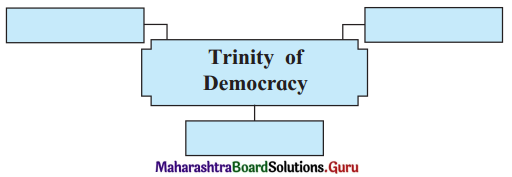

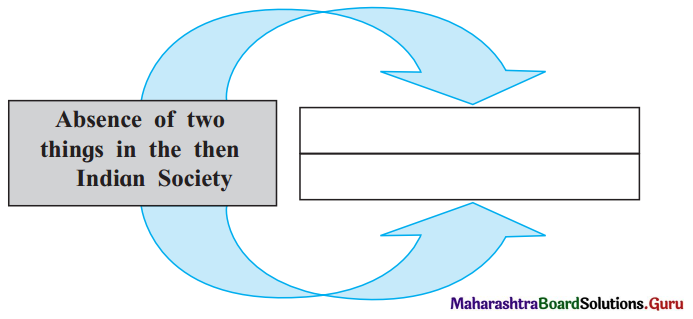



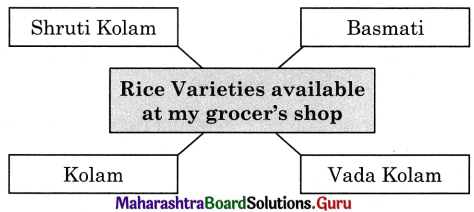


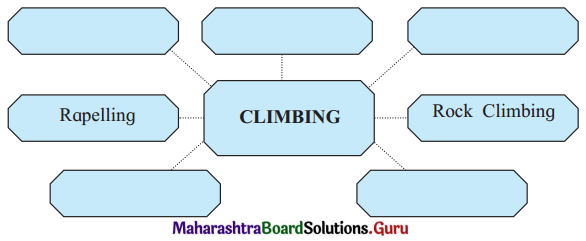


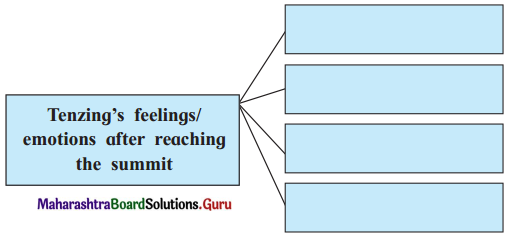
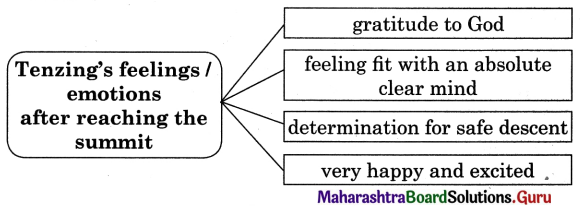
 Answer:
Answer:
